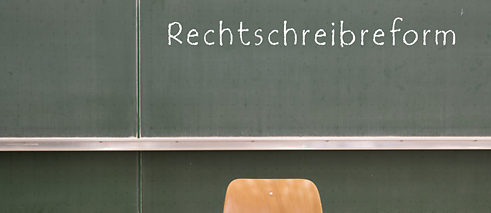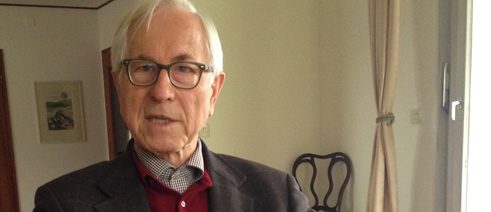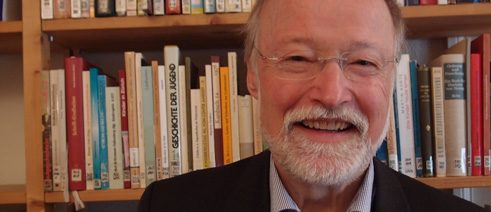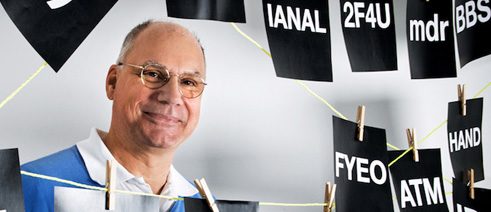German Spelling Reform
Nearly a Culture War

Since 1st August 2006 the new spelling rules have been in force in Germany. The lead-up to it was plagued by a bitter dispute – proponents wanted to simplify the spelling rules, critics feared a degeneration of the language.
A small scrap of paper that has turned yellow, you can see that it has been unfolded many times and then refolded. There are only a few words written on it, but in a most concise way they document one of the fiercest culture wars Germany has ever seen. Since 1996 Gerhard Augst has been carrying this list around with him wherever he goes. In crisp and clear handwriting he noted down back then all the things he was accused of. “The critics really got their teeth into me,” says the linguist and professor emeritus of German at the University of Siegen.
What we are talking about is the German spelling reform – a reform that would never have taken place without Gerhard Augst. In 1980 in collaboration with German philologists from the Federal Republic of Germany, the GDR, Switzerland and Austria he founded the Internationale Arbeitskreis für Orthographie (International Working Group for Orthography). The philologists’ goal was to simplify German spelling. There were to be fewer exceptions to the rule, sub-rules and cases of doubt.
A radical simplification
The reformers based their work on the theory of the so-called class-specific language barriers. According to this, children from families with little formal education face particular difficulties in learning to spell. This could lead, as was said, to a selection process on the basis of social background. A reform of the rules was to bring about change. If spelling were made easier – as the idea went – then it would no longer be a barrier, nor an obstacle, to social advancement. “What can be learned in eight or nine years of schooling, should be enough to enable people to write properly,” was one of Augst’s main arguments. Gerhard Augst: “people have become a little more casual in their approach to spelling”
| Photo (detail) © Monika Dittrich
Gerhard Augst: “people have become a little more casual in their approach to spelling”
| Photo (detail) © Monika Dittrich
In 1987 the Federal Ministry of the Interior and the Standing Conference of Education Ministers commissioned the drafting of a new set of rules for German spelling. From 1990 onwards Gerhard Augst was chief coordinator of the Kommission für Rechtschreibfragen (Commission on Spelling Issues) at the Institut für Deutsche Sprache (Institute for the German Language) in Mannheim and thus became one of the people primarily responsible for the reform in Germany. The first proposals were radical – they wanted, for example, to spell Boot (German for boat) as Bot and Kaiser (German for emperor) as Keiser.
The concept was discussed, altered, sanitised, until, on 1st July 1996, Germany, Austria, Switzerland and some other countries that have German communities pledged themselves to introduce a reformed orthography in the Wiener Absichtserklärung (The Vienna Declaration of Intent). On 1st August 1998, the new rules came into force. Among the best known changes was the one from the German letter ß to the double-s after a short vowel: German words like Kuß (kiss), Fluß (river) and Schluß (end) became Kuss, Fluss and Schluss. Foreign words were germanised, such as Potenzial rather than Potential. In addition, more words were to be written as two words, for example, Rad fahren instead of radfahren (to cycle) or kennen lerneninstead of kennenlernen (to get to know). The reform appeared to be signed and sealed: Gerhard Augst and his colleagues felt they had achieved their goal. But things turned out differently. This was when the controversy really heated up and nearly assumed proportions of a cultural war.
A degeneration of the language
“The spelling reform is as useful as a hole in the head,” says Friedrich Denk. Today he is 73 years old, yet still sounds as belligerent as ever. He was among the most influential opponents of the spelling reform. As a teacher at a grammar school in Weilheim in Upper Bavaria he was not willing to accept the new spelling – and definitely not willing to teach it. He was of the opinion that the reform denigrated the German language and, on top of that, would be expensive – “it only meant a roaring trade for dictionary and textbook publishers,” says Denk. He and other opponents of the reform primarily saw the intended simplification as a degeneration, a flattening, of the German language. In the case of writing an old word as two words in the new system certain possibilities of meaning would be lost. Friedrich Denk: “as useful as a hole in the head – a small one, but a painful one”
| Photo (detail) © Friedrich Denk
Friedrich Denk: “as useful as a hole in the head – a small one, but a painful one”
| Photo (detail) © Friedrich Denk
Denk got writers and intellectuals to rally behind him, collected signatures, published the Frankfurt Declaration on the Spelling Reform and founded an action group. In 1998 even the Federal Constitutional Court had to deal with the reform. It declared, however, that the introduction of the reformed rules by means of a decree passed by the Ministers of Education was in fact lawful. The dispute on the reform then dragged on through the next few years. In surveys conducted, for example, by the Allensbach Institute for Public Opinion Research the majority of Germans wanted to retain the old spelling rules. Dozens of newspapers and publishers who had introduced the new spelling rules initially, went back to the traditional spelling rules. Chaos reigned supreme, the reform almost failed.
Language online
In 2004 the education ministers of the individual German federal states put the emergency brakes on and founded the Rat für deutsche Rechtschreibung (Council for German Spelling). The council worked out a compromise: some rules from 1996 were dropped, others retained, for example, the double-s after a short vowel. In the case of kennen lernen instead of kennenlernen (to get to know), both versions were permitted. This “reformed” reform, which came into force on 1st August 2006, corresponds more or less to the present rules – and it also finally put an end to the debate. In January 2007, the Frankfurter Allgemeine Zeitung newspaper and other reform-critical newspapers accepted the modified rules and started to apply them. The new system established itself and it is the only system today's students know. Peter Schlobinski: “forget once and for all about the spelling reform”
| Photo (detail) © GfdS
Peter Schlobinski: “forget once and for all about the spelling reform”
| Photo (detail) © GfdS
“These days you can forget once and for all about the spelling reform,” says Peter Schlobinski, Professor of German at the University of Hanover and head of the Gesellschaft für deutsche Sprache (Association for the German Language). His conviction: “Nowadays digitalisation has much more of an influence on the language than the spelling reform ever had.” Schlobinski has carried out research on the language used on the Internet, for example, on Twitter, Facebook or in e-mails. Spelling rules are dealt with very casually online, but that is not necessarily a disadvantage: “There is an experimental and creative use of language and that's very positive.”
Discuss this with us
And what is your position on the spelling reform? Do we need more rules about our language or fewer? And what about the new media – a blessing or a curse for the language? Discuss this with us.